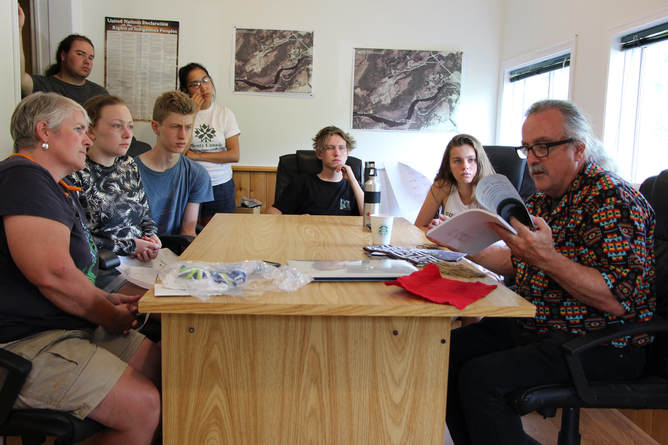|
Barry Sarazin from Pikwakanagan First Nation, Chuck Commanda from Kitiga Zibi First Nation, Larry McDermott from Sharbot Obajiwinan First Nation, and Plenty Canada Summer Students hosted a gathering to share the language, stories, and teachings of the Anishinaabeg people. The opportunity to educate non-Indigenous youth was seized, as Biosphere Education joined the gathering. Biosphere Education is an organization dedicated to preserving Earths beautiful creatures through storytelling and photo journalism, and for this year’s expedition four youth, led by biologist Dr. Shelley Ball, joined an on-going project to better understand how climate change may affect wild rice, or as it is known by the Anishninaabeg people, Manoomin. By bringing together knowledge holders and the biosphere youth expedition, we created a cross-cultural dialogue that helped gain a deeper understanding of biodiversity for all attendees. Students helped Plenty Canada complete a benthic invertebrate diversity index for McCullochs Mud Lake, a nearby provincially significant wetland, that is home to species at risk such as the Least bittern, and Black tern. This data will be shared in a final report that highlights Manoomin, and how climate change may affect this sacred, and only cereal native to North America.
0 Comments
Your comment will be posted after it is approved.
Leave a Reply. |
|
-
Home
- Donate
-
Projects
-
Canada
>
- Plenty Canada CampUs
- The Healing Places
- Two-Eyed Seeing Bird Knowledge
- Niagara Escarpment Biosphere Network
- Greenbelt Indigenous Botanical Survey
- Great Niagara Escarpment Indigenous Cultural Map
- Ginawaydaganuc Indigenous Food Sovereignty
- Indigenous Languages and Cultures Programs >
- Wild Rice
- Good Mind Grappling (partnership)
- Ginawaydaganuc Village (partnership)
- Youth Programming >
- Americas >
- Africa >
-
Canada
>
- News
- Resources
- Partners
- Contact Us
Our Location266 Plenty Lane Lanark, Ontario Canada K0G 1K0 (613) 278-2215 |
Donate to
|
Subscribe to our Newsletter |

